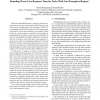Free Online Productivity Tools
i2Speak
i2Symbol
i2OCR
iTex2Img
iWeb2Print
iWeb2Shot
i2Type
iPdf2Split
iPdf2Merge
i2Bopomofo
i2Arabic
i2Style
i2Image
i2PDF
iLatex2Rtf
Sci2ools
RTAS
2008
IEEE
2008
IEEE
Bounding Worst-Case Response Time for Tasks with Non-Preemptive Regions
Real-time schedulability theory requires a priori knowledge of the worst-case execution time (WCET) of every task in the system. Fundamental to the calculation of WCET is a scheduling policy that determines priorities among tasks. Such policies can be non-preemptive or preemptive. While the former reduces analysis complexity and overhead in implementation, the latter provides increased flexibility in terms of schedulability for higher utilizations of arbitrary task sets. In practice, tasks often have non-preemptive regions but are otherwise scheduled preemptively. To bound the WCET of tasks, architectural features have to be considered in the context of a scheduling scheme. In particular, preemption affects caches, which can be modeled by bounding the cache-related preemption delay (CRPD) of a task. In this paper, we propose a framework that provides safe and tight bounds of the data-cache related preemption delay (D-CRPD), the WCET and the worst-case response times, not just for hom...
| Added | 01 Jun 2010 |
| Updated | 01 Jun 2010 |
| Type | Conference |
| Year | 2008 |
| Where | RTAS |
| Authors | Harini Ramaprasad, Frank Mueller |
Comments (0)

